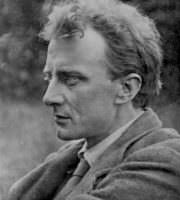About Edward Thomas
Edward Thomas (March 3, 1878 – April 9, 1917) was a Welsh-born British poet and essayist. He is generally considered one of the Poets Of War, although very few of his poems relate directly to his experience at the front. Edward Thomas did not start writing poems until 1914, when his career in poetry only came after he had already been a successful writer and literary critic. He enlisted in the British armed forces during the First World War. He died during the Battle of Arras in 1917, shortly after his arrival in France. He published his first collection Six Poems, under pseudonym Edward Eastaway in 1916 by Pear Tree Press, followed by Poems, published by Holt, in 1917, which included The Sign-Post. After his death, Last Poems, was published by Selwyn & Blount in 1918, followed by Collected Poems, published by the same publisher in 1920.Thomas's poems are written in a colloquial style and frequently feature the English countryside. The short poem In Memoriam exemplifies how his poetry blends the themes of war and the countryside. On 11 November 1985, Thomas was among 16 Great War poets commemorated on a slate stone unveiled in Westminster Abbey's Poet's Corner. The inscription, written by fellow poet Wilfred Owen, reads: My subject is War, and the pity of War. The Poetry is in the pity.
Browse all poems and texts published on Edward Thomas
Thomas was described by British Poet Laureate Ted Hughes as The Father Of Us All.









